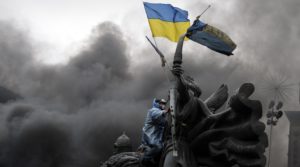 The war in Europe, specifically the attack on Ukraine, has eclipsed international security priorities including “the worldwide fight against terrorism”. Another important point is that it has shed new light on the reality of diplomatic relations between African states and their Western partners. And that was only a few days after their agreement at the African Union – European Union Summit in Brussels!
The war in Europe, specifically the attack on Ukraine, has eclipsed international security priorities including “the worldwide fight against terrorism”. Another important point is that it has shed new light on the reality of diplomatic relations between African states and their Western partners. And that was only a few days after their agreement at the African Union – European Union Summit in Brussels!
How then to interpret that agreement and what will be its impact on future relations between the two regions, including in particular their combat against terrorism in the Sahel?
Often indecisive relationships.
In addition to the classic issues of debt relief and the recovery of African economies, the Brussels summit and its large attendance of heads of states, concluded with commitments in favor of prosperity for all. This through a partnership aiming precisely at ensuring political stability based on exchange and sharing of experiences in various areas: infrastructure, green technologies and public as well as private investments.
Facing complex and increasingly cross-border threats, such as terrorism, cyberattacks and other hybrid threats, a partnership was essential. Specifically, the final communiqué mentions the need to coordinate joint efforts, in particular to address the root causes of instability and radicalization in order to move towards the lasting resolution of crises and the construction of durable peace.
That consensus between partners should be achieved through “differently conducted frank discussions”, stated the AU commission chairman, adding: “a renewed partnership, a new beginning and common goals and joint governance in a constructive spirit”. The forty African heads of States and the 27 European leaders have thus agreed to change the rhetoric for the better.
This innovative diplomatic edifice soon experienced its first political test: the war in Ukraine.
Following the Russian veto in the Security Council, the Ukrainian question was brought before the United Nations General Assembly for a political vote even though it could not be binding. On March 2, 2022, the United Nations General Assembly adopted a recommendation, led by the European Union and Ukraine, « demanding that Russia immediately cease the use of force against Ukraine ». Of the 193 member states, 141 approved the text, five opposed it and 35 abstained. The Africans votes were: 28 Yes, 01 No, 17 Abstentions and 08 Non present. That African vote, mostly though not unanimously in favor of Ukraine, was severely taken by their European partners.
Different judgments.
Beyond their governments’ standing, to many Africans, the war is perceived more as a return to the Cold War than a conflict such as those currently underway in the Middle East or in Africa. The automatic solidarity with the Ukrainians (refugees, displaced persons) and the opening of the media and parliaments to the Kyiv government, the promptness and severity of the sanctions taken against Moscow, all recalled and belonged to the cold war era. Nothing compared to the interest and assistance given to the consequences of the deadly wars of the South. Has that unanimous mobilization of western countries reminded Africans of the Cold War era Blocks’ solidarities and of the Third World countries neutrality at that time? Some African states that voted in favor of the resolution may have thought so. However, their majority, aware of their own fragility in the face of powerful neighbors, supported the proposed text. In reality, few Africans expected a war in the developed countries as indeed since the end of the Cold War, except for the ex-Yugoslavia, conflicts have raged mainly in the South.
Will a falling out between Europe and Africa, over the votes in the General Assembly and the Commission on Human Rights in Geneva, weaken the recommendations made in Brussels during the AU / EU summit? Probably, though not lastingly as everyone would be a loser. If, one way or the other, the African vote in New York was not automatic, the Brussels Summit partners should consolidate the bases of their relationships through more frequent consultations. Thus they would be more sustainable if more transparent and better shared.
Very fragile, and it is likely to be more so in the months to come, the security situation across the Sahel and around the Gulfs of Guinea and Benin calls for solidarity between partners. Beyond the unfortunate events surrounding the Malian situation, the commitments made in Brussels go in the right direction to combat terrorism.
As during the Cold War, political breakups are the easiest choices to make. Persisting in a narrow or dead-end way was then highly valued by authoritarian regimes. Today, unlike that period, social networks and fake news offer immense choices to everyone and in particular to young unemployed Africans in the capitals. Moreover, they give a solid base to all those who aspire to change. The nature of that change does not matter to them.
The prolongation of what should be called a war in Europe is an extraordinary human, diplomatic and economic upheaval. It is also a disruption of the image of countries known, since the end of the Second World War and especially that of the Cold War, for their tolerance in favor of the minorities, the weak and the disabled as well as other defenseless groups. A tolerance that is now being severely tested and whose consequences – intolerance and exaltation – will unfortunately survive the war in Ukraine and the fight against terrorism in the Sahel.
Ahmedou Ould Abdallah, president Centre4s.org, former United Nations Special Representative.
